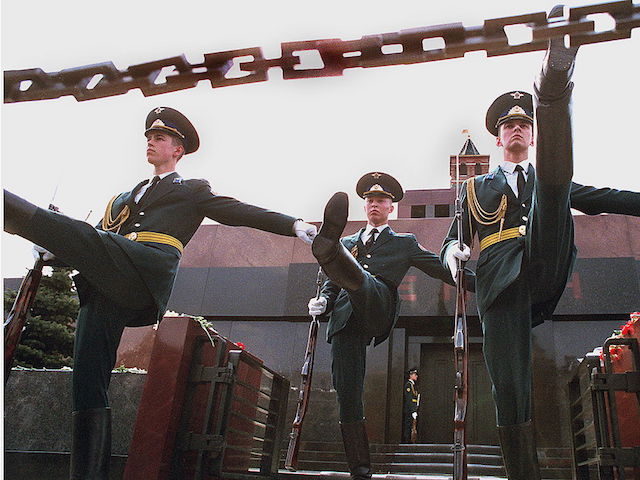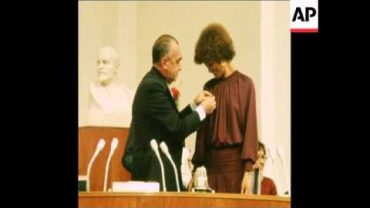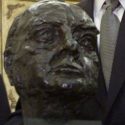3 Lessons on the 25th Anniversary of the Soviet Union’s Fall
December 25 marked the 25th anniversary of the collapse of the Soviet Union. On this occasion, it is urgent for us to reflect on 3 key lessons that the fall of the Evil Empire provided. They are lessons that the new incoming Trump administration must put into action immediately vis-à-vis our enemy in the terror war.
Lesson #1: Go on the Offense Against Islamic Supremacism
While we know that the Soviet Union collapsed, on many realms, from within, the record is clear that President Reagan also fueled the collapse. By moving against détente and beyond containment, Reagan’s aggressive anti-communism saw the U.S. take on a strategic offensive against the Soviet Union which led to victory. As Paul Kengor has documented in his book, The Crusader, Reagan fought not to just contain, but to win. His administration’s massive defense build-up, support of anti-communist rebels around the world, support of dissident movements behind the Iron Curtain, promotion of SDI, and many other aggressive policies put a heavy pressure on the Soviet Union that ultimately broke its already fragile legs.
Thus, we see how in our present-day conflict with Islamic Supremacism, we need to go on the offensive. In order to do that, we must first take two crucial steps. The first step is to name the enemy; the second is to formulate an actual doctrine against him. As Sebastian Gorka urges in Defeating Jihad, the U.S. government needs to lay down a vision, an actual “threat doctrine analysis” in a thorough document, just like George Kennan’s Long Telegram and NSC-68 did in laying out the strategic foundation to fighting communism in the Cold War. The new incoming Trump administration, therefore, must articulate a threat doctrine analysis and then shape it into a Reagan-like doctrine of offense.

Lesson #2: Deceive the Totalitarian Enemy into Being Pluralistic
In Reagan’s War, Peter Schweizer revealed how the Reagan administration cleverly promoted the process of change within the Soviet Union towards a more pluralistic political and economic system. This was a brilliant approach, seeing that Gorbachev’s policies of Glasnost and Perestroika clearly triggered communism’s collapse.
Henry Kissinger has shrewdly delineated how Gorbachev’s effort to reform, as well as to salvage, Soviet communism was the very ingredient that fueled its disintegration. Indeed, once Moscow ended its total and intrusive control of its satellites, and once it allowed free discussion, it signed its own death warrant. Gorbachev wanted to de-Stalinize, yet he could not do so without destroying the regime itself. Kissinger writes:
Gorbachev’s gamble on liberalization was bound to fail. To the degree that the Communist Party had lost its monolithic character, it became demoralized. Liberalization proved incompatible with communist rule — the communists could not turn themselves into democrats without ceasing to be communists, an equation Gorbachev never understood.
To be sure, the whole idea of de-Stalinization was based on the assumption that the Soviet regime could survive without its despotic component; that it could endure a reconciliation with its past. But a legitimate examination of the causes of Stalinism could not occur without an uncensored evaluation of Leninism, which the Soviet system could not allow without risking the de-legitimization of its entire foundation.
This is a crucial lesson for our leadership in the terror war. But first, let us be clear: we must not buy into Natan Sharansky’s naive assumption that all people want freedom. They do not, especially Sharia-believers. The dark consequences of the so-called “Arab Spring” taught us this painful lesson well, as we witnessed the process of “democratization” in the Middle East lead to a totalitarian Islamist Winter.
But this does not mean that we do not heed one of Sharansky’s profound implications: that we must follow Reagan’s example of undermining the enemy by encouraging certain tyrannical entities to behave like pluralists. There is huge potential in nudging tyrants to open up free discussion and to hold their terror back – for freedom and spoken truth have a corrosive effect on tyranny’s chains. Indeed, just imagine, for instance, if leaders within the Islamic world started showing off how pluralistic they were and began allowing a free and honest discussion on the ingredients of their prophet Mohammed’s life.
Lesson #3: Verbally Take the Moral High Ground
In his June 1982 speech before the British House of Commons, President Reagan announced that he had a long-term plan “which will leave Marxism-Leninism on the ash heap of history.” The next year, on March 8, 1983, he famously called the Soviet Union the “Evil Empire.” Four years later, in June 1987, he challenged Gorbachev to “tear down” the Berlin Wall. All of these pronouncements were crucial in the U.S. strategy of defeating Soviet communism. They upped the stakes and achieved moral clarity. They cut the dividing line between the good guys and the bad guys, and they called out the Soviets for the evil oppressors that they were. In so doing, these pronouncements also made it clear that the future was not on the Soviets’ side.
William F. Buckley, Jr. profoundly noted that by calling the Soviet Union the “Evil Empire,” Reagan had formulated the galvanizing summation to Alexander Solzhenitsyn’s Gulag Archipelago and, consequently, “the countdown for Communism began then.” And indeed, two years after challenging Gorbachev to tear down the Berlin Wall, the wall came down.
The lesson here for the new incoming president is that the moral difference between our side and Islamic Supremacism must be spoken. The divide must be drawn in no uncertain terms.
President Trump can be most effective in this regard by bringing attention to all the victims of Sharia and Jihad, and emphasizing that Muslims are also the victims of Islamic Supremacism. One of the most urgent causes to promote is the women’s rights issue. American leadership must make it transparently clear, once and for all, which civilization stands for women and what entity denigrates and mutilates them.
Trump must deliver a special speech that unveils the victims of honor killings, acid attacks and female genital mutilation, and of forced veiling, forced marriage and forced segregation under Islam – and issue a concrete challenge as Reagan did to Gorbachev. He must point to the tyrannical wall of Islamic gender apartheid and pronounce unequivocally: Imams, muftis and clerics of the world, tear down this wall.
Trump must do this while simultaneously shattering the Left’s and Muslim Brotherhood’s favorite propaganda lie: that standing up to Islamic Supremacism and telling the truth about its inspirations is somehow instigating hatred of all Muslim people. This is a pernicious ploy based on a faulty conflation of Islam with Muslims. It must be made categorically clear that we are dealing with an ideology; we are not hating all the people who fall under its grasp. There are millions of people who go under the label “Muslim” but who may not agree with, or follow, all Islamic mandates, or who may want to reform them, or who may not even know anything about them – or who may have simply been born into the religion and were never even given a choice as to who they wanted to be. We have no problem with these people. And as a matter of fact, our standing up to Islamic Supremacism is a defense of these Muslims because they are, like millions of Muslims around the world, also victims of Islamic Supremacism.
All in all, the point must be driven home that we are on the side of Muslim people, and especially of those, like Zuhdi Jasser, who seek to reform Islam and bring it into the modern world.
And so, in reflecting on these three lessons of the fall of the Soviet Union 25 years ago, we begin to gauge how, if applied with precision, they can help our new incoming president launch a winning strategy against our enemy in the terror war. Trump shows every sign that he can and will achieve this. He has demonstrated himself to be a good man who loves his country and who wants the best for it. He has shown a willingness to name the enemy and to take the war to him. He has also surrounded himself with all the noble and high-caliber people who are determined to set America on the winning course.
If all these pieces fall into place, President Trump will succeed, as Reagan did, in setting the stage for yet another glorious chapter – a chapter that sees an Evil Empire stagger to its knees and then, when finally shamed and crippled, cast where it belongs: on the ash heap of history.
Jamie Glazov is the editor of Frontpagemag.com. He holds a Ph.D. in History with a specialty in Russian, U.S. and Canadian foreign policy. He is the author of United in Hate, the host of the web-TV show, The Glazov Gang, and can be reached at [email protected].






